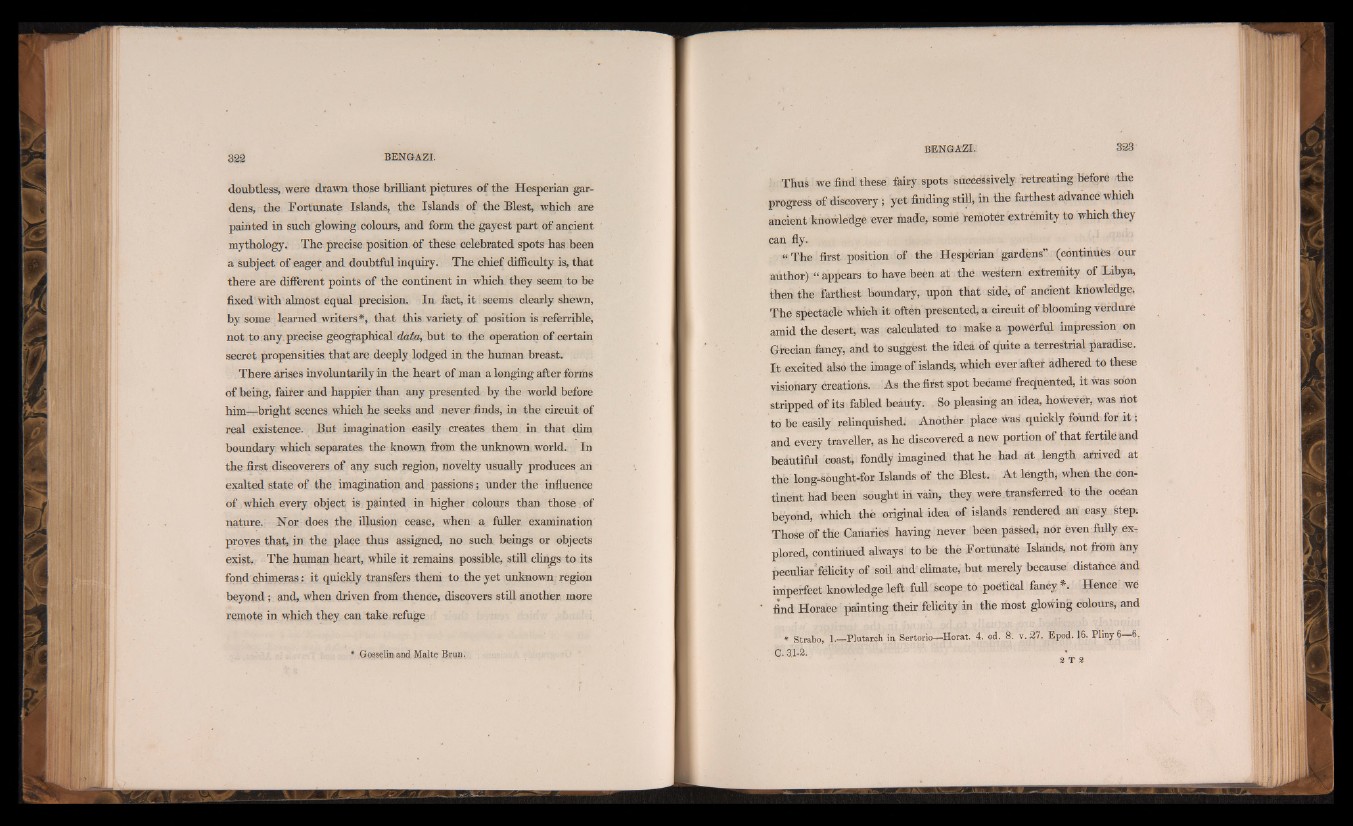
doubtless, were drawn those brilliant pictures of the Hesperian gardens,
the Fortunate Islands, the Islands of the Blest, which are
painted in such glowing colours, and form the gayest part of ancient
mythology. The precise position, of these celebrated spots has been
a subject of eager and doubtful inquiry. The chief difficulty is, that
there are different points of the continent in which they seem to be
fixed with almost equal precision. In fact, it seems clearly shewn,
by some learned writers*, that this variety of position is referrible,
not to any precise geographical data, but to the operation of certain
secret propensities that are deeply lodged in the human breast.
There arises involuntarily in the heart of man a longing after forms
of being, fairer and happier than any presented by the world before
him—bright scenes which he seeks and never finds, in the circuit of
real existence. But imagination easily creates them in that dim
boundary which separates the known from the unknown world. In
the first discoverers of any such region, novelty usually produces an
exalted state of the imagination and passions; under the influence
of which every object is painted in higher colours than those of
nature. Nor does the illusion cease, when a fuller examination
proves that, in the place thus assigned, no such beings or objects
exist, The human heart, while it remains possible, still clings to its
fond chimeras: it quickly transfers them to the yet unknown region
beyond; and, when driven from thence, discovers still another more
remote in which they can take refuge
Gosselin and Malte Brun.
Thus we find these fairy spots successively retreating before the
progress of discovery | yet finding still, in the farthest advance which
ancient knowledgè ever made, some remoter extremity to which they
can fly.
I The first position of the Hesperian gardens” (continues our
author) “ appears to have been at the western extremity of Libya,
then the farthest boundary, upon that side, of ancient knowledge,
The spectacle which it often presented, a circuit of blooming verdure
amid the desert, was calculated to make a powerful impression on
Grecian fancy, and to suggest the idea òf quite a terrestrial paradise.
I t excited also the image of islands, which ever after adhered to these
visionary creations. As the first spot became frequented, it was soon
stripped of its fabled beauty; . So pleasing an idea, however, was not
to be easily relinquished. Another place was quickly found for it ;
and every traveller, as he discovered a new portion of that fertile and
beautiful coast, fondly imagined that he had at length arrived at
the long-sought-for Islands of the Blest. At length, when the continent
had been sought in vain, they were transferred to the océan
beyond, which thè original idea of islands rendered an easy step.
Those of the Canaries having never been passed, nor even fully explored,
continued always to be thè Fortunate Islands, not from any
peculiar felicity of soil and climate, but merely because distance and
imperfect knowledge left full scope to poetical fancy *. Hence wé
find Horace painting their felicity in the most glowing colours, and
* Strabo, 1.—Plutarch in Sertorio—Horat. 4. od. 8. v.27. Epod. 16. Pliny 6 6.